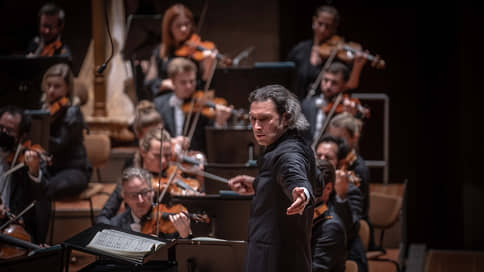Jazz is not necessary at times – Newspaper Kommersant No. 174 (7375) of 09/21/2022
[ad_1]

The international symphony festival Musikfest Berlin has come to an end. His repertoire range seems immense, however, upon closer examination, hidden logic, system and meaningfully placed accents are caught in the motley poster. Followed the ups and downs of the festival plot Gular Sadykh-zade.
Winrich Hopp, art director of the festival, knows how to come up with original programs and integrate them into the current socio-cultural context like no one else. This year Janis Xenakis was in the focus of attention. Four important pieces by Xenakis were performed at the festival – the famous quartet “Tetris”, “Jalons” for 15 instruments, “Empreintes” for large orchestra and finally “Ais” for 96 instruments performed by the Berlin Radio Orchestra under its chief conductor Vladimir Yurovsky.
“Ais” is a completely mystical thing; in it, the author refers to the images of death, melancholy reflects on the nature of the other world, depicting the languor of immortal souls residing in Hades by means of the orchestra. The image of Ulysses is at the center of the narrative: texts from the Odyssey and the Iliad and stanzas from Sappho are used in the composition. But there is no vocal in the traditional sense: instead of it, there are piercing screams on one repeating tone, reminiscent of the cries of seagulls, the scream of an eagle, the howls of monsters. The extreme vocals of Georg Nigl, intoning the part in two different registers and two different timbres – a piercing treble on one note or an extremely low baritone bass – made a stunning impression. The virtuoso performance of percussionist Dirk Rothbrust, who with his impressive instrumentation led a serious sound battle with the singer, was no less stunning.
The discourse associated with the post-war avant-garde logically continued the opus of the American Morton Feldman – his last orchestral work “Coptic Light”, inspired by the patterns and colors of ancient Coptic fabrics, was performed at the end of the festival by the Deutsches Symphonie-Orchester Berlin (DSO) conducted by Robin Ticciati.
With all that, in four of the fifteen symphony concerts, Mahler’s symphonies were performed: the Sixth, First, Second, Fifth. The last one was led by Vladimir Yurovsky with incredible ardor, passion, earnest, almost fanatical concentration of will; he seemed to be extracting from the orchestra entrusted to him everything he was capable of by physical effort. By the intonation meaningfulness with which each musician played, by the enthusiasm and off-scale energy of the game, it was felt that Maestro Yurovsky did a lot of educational work with them. The intentions were impressive, however, the performance tasks that the conductor set for the orchestra were fulfilled with a strict four: after all, the technical capabilities of the team did not reach the level required by the high-speed tempos set by the conductor and the rhythmic complexity of the score of Mahler’s Fifth.
Another important name at the festival, as it turned out, is Jean Sibelius. His Seventh Symphony was excellently performed by the London Symphony Orchestra with Simon Rattle, and his most famous, Second, by the Odessa Philharmonic conducted by Hobart Earle. Robin Ticciati with DSO completed the Sibelius plot by offering his interpretation of the Finnish classic’s most enigmatic poem, Tapiola, in which the conductor savored the intricate interweaving of motifs and the unpredictable shimmer of the poem’s form with the slowness of a gourmet.
Comparison of the names of composers belonging to the era of modern rather than post-romanticism, Mahler and Sibelius, drew the main line of the program. But on this trunk, every now and then, interesting branches of side program plots arose.
Take, for example, the program of the Rome Orchestra of the Academy of Santa Cecilia, which arrived in Berlin after a long break together with its chief conductor Antonio Pappano. In the first part, Schoenberg’s “Enlightened Night” was played – an early composition in which the author is entirely in line with the late romantic style and has not yet completely outlived his passion for Wagner and Richard Strauss.
What a contrast with the second branch! The Italians overcame – there is no other way to say it – the cyclopean and rare Piano Concerto of Ferruccio Busoni: in five parts, lasting more than 80 minutes and requiring huge performing resources. A huge orchestra, a massive choir and a hardy soloist, capable of without respite, fortissimo, spewing from the depths of the piano cascades of octaves, waterfalls of chord passages and other virtuoso excesses that Busoni was fond of beyond measure. Igor Levit coped with an extremely difficult task with dignity.
However, the program chosen by the Italians had a special meaning. Pairing in one poster the names of Schoenberg, the founder of the New Vienna School, and Ferruccio Busoni, whose life was equally connected with both Italy and Berlin, was very appropriate. The inclusion of the Busoni concerto and Schoenberg’s opus in the concert program was clearly read as a gesture of courtesy and affection from the guests of the festival to its hosts: both authors performed were associated with Berlin, Busoni considered Berlin his city, although he was Italian by birth.
Musikfest ended with an unexpected stylistic modulation towards jazz. The Bigband Deutsche Oper at the final concert paid tribute to legendary bassist and jazz composer Charles Mingus by performing his grandiose Epitaph, a two-hour opus in which the author captures almost the entire history of jazz, from gospel to bebop, in musical quotations and allusions. Thus, in the finale, the festival suddenly broke out of the framework of academic music, and its program acquired signs of an open form.
[ad_2]
Source link






